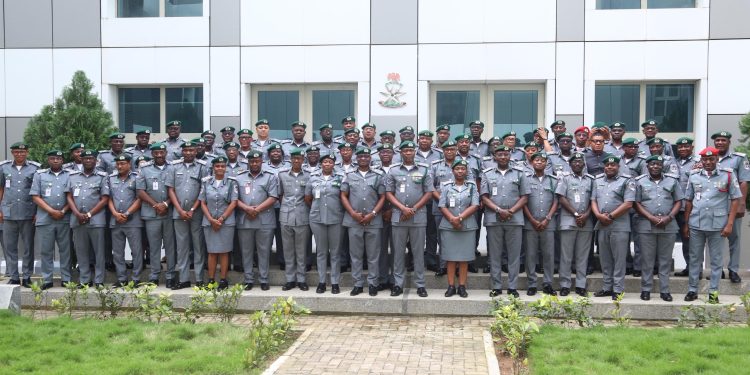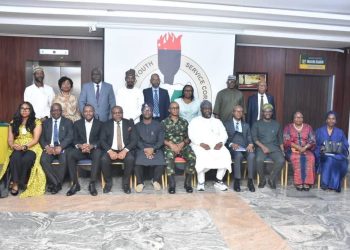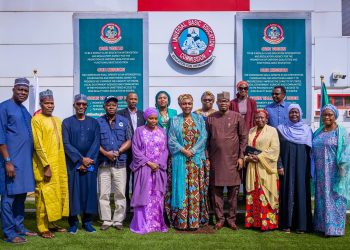By Nkechi Eze
In a bold step toward transforming trade facilitation in Nigeria, the Nigeria Customs Service (NCS) has officially introduced its One-Stop-Shop (OSS) Initiative, a reform designed to reduce cargo clearance time from 21 days to just 48 hours. The initiative was unveiled on Thursday, 23 September 2025, during a high-level meeting of the NCS Management and Customs Area Controllers in Abuja, chaired by the Comptroller-General of Customs (CGC), Bashir Adewale Adeniyi.
The Abuja meeting brought together senior Customs officers to deliberate on the Service’s ongoing modernisation drive and to reaffirm the central role of leadership in ensuring that reforms translate into real impact at the ports and across commands nationwide.
Speaking while unveiling the OSS, Adeniyi described the reform as a “transformative shift” in line with global best practices and in furtherance of the Federal Government’s Ease of Doing Business policy. According to him, the One-Stop-Shop will sanitise Customs operations, reduce duplication of efforts, and provide predictability and transparency that will restore trader confidence.
“The OSS initiative will not only shorten clearance time from 21 days to 48 hours, but it will also strengthen trader confidence, restore transparency, and make our operations more business-friendly,” the Comptroller-General declared.
He explained that under the OSS framework, all Customs units will collaborate jointly on flagged declarations, ensuring that consignments are processed and cleared under one roof without the burden of multiple checks or the risk of post-clearance re-interceptions. This, he said, would significantly reduce costs for traders and importers while enhancing efficiency in trade facilitation.
While acknowledging the central role of technology in modern Customs administration, Adeniyi stressed that face-to-face engagement with officers remains invaluable in driving reforms. “As much as technology has helped us, it has its limits. There are moments when physical presence, coming together under one roof, adds weight and value to our deliberations. Meetings like this strengthen our unity of purpose and ensure we speak with one voice,” he told the gathering.
The Comptroller-General also disclosed that a new accountability framework was being rolled out alongside the OSS. This includes a centralised dashboard that will track clearance times, monitor interventions, and assess stakeholder satisfaction, ensuring that the Service maintains strict oversight of operational performance.
According to Adeniyi, the OSS will initially be piloted at Apapa, Tin Can Island, and Onne Ports before being scaled up across all Customs formations nationwide. He emphasised that the reform is fully backed by the Nigeria Customs Service Act 2023 and aligned with the World Trade Organisation’s Trade Facilitation Agreement (TFA).
“This is not just a policy. It is a statement of intent that reflects our determination to build a modern, transparent, and trader-friendly Customs Service,” Adeniyi concluded.
In response, the Customs Area Controllers at the meeting pledged their full commitment to driving the reform in their respective commands. They described the initiative as timely and necessary, assuring the Comptroller-General that they would work in synergy to achieve the 48-hour clearance benchmark and reposition the Service for greater efficiency.
The OSS Initiative marks one of the most ambitious reform steps taken by the NCS in recent years, promising to reshape Nigeria’s port operations and unlock new opportunities for trade competitiveness in the global marketplace.

















